
The Book of Psalms, commonly referred to simply as Psalms, the Psalter or "the Psalms", is the first book of the Ketuvim ("Writings"), the third section of the Tanakh, and a book of the Christian Old Testament. The title is derived from the Greek translation, ψαλμοί, psalmoi, meaning "instrumental music" and, by extension, "the words accompanying the music". The book is an anthology of individual psalms, with 150 in the Jewish and Western Christian tradition and more in the Eastern Christian churches. Many are linked to the name of David, but modern scholarship rejects his authorship.
Hallelujah is an interjection used as an expression of gratitude and adoration. It is a transliteration of the Hebrew phrase הַלְלוּ יָהּ, which means to praise God The term is used 24 times in the Hebrew Bible, twice in deuterocanonical books, and four times in the Christian Book of Revelation.
The Psalms of Asaph are the twelve psalms numbered as 50 and 73–83 in the Masoretic Text, and as 49 and 72–82 in the Septuagint. They are located in the Book of Psalms in the Hebrew Bible. Scholars have determined that a psalm's attribution to Asaph can mean a variety of things. It could mean that the psalms were a part of a collection from the Asaphites, a name commonly used to identify temple singers. Another possibility is that the psalms were performed in the style or tradition of the guild bearing Asaph's name. Asaph is said to either be the author or the transcriber of these psalms. He may not have said these psalms but transcribed the words of David. No specific time period is known to be associated with these Psalms, but the record of destruction noted in Psalm 74 may indicate that these Psalms came from the post-exilic period.

Psalm 83 is the 83rd psalm of the biblical Book of Psalms. In the slightly different numbering system of the Greek Septuagint version of the Bible and its Latin translation, the Vulgate, this psalm is Psalm 81.
Gender in Bible translation concerns various issues, such as the gender of God and generic antecedents in reference to people. Bruce Metzger states that the English language is so biased towards the male gender that it restricts and obscures the meaning of the original language, which was more gender-inclusive than a literal translation would convey. Wayne Grudem disagrees, believing that a translation should try to match the words of the original language rather than introduce the translator's opinion as to whether the original words meant to include both sexes or not, and that trying to be gender-neutral results in vague and contorted writing style. Michael Marlowe argues from a third standpoint, that the Bible is patriarchal, and gender-neutral language distorts its meaning in an attempt by translators like Metzger to impose their progressive modern views on the text. The topic has theological and political undercurrents. Paul Mankowski says that inclusive-language translators are bowing to feminist political taboos rather than trying to translate accurately, while Marmy Clason says that their opponents are motivated by hostility to feminism rather than fidelity to the original meaning.
Ashrei is a prayer that is recited at least three times daily in Jewish prayers, twice during Shacharit and once during Mincha. The prayer is composed primarily of Psalm 145 in its entirety, with Psalms 84:5 and Psalms 144:15 added to the beginning, and Psalms 115:18 added to the end. The first two verses that are added both start with the Hebrew word ashrei, hence the prayer's name.
Pesukei dezimra or zemirot, as they are called in the Spanish and Portuguese tradition, are a group of praises that may be recited daily during Jewish morning services. They consist of various blessings, psalms, and sequences of verses. Historically, Pesukei dezimra was a practice of only the especially pious. However, it has since become a widespread custom among even the laymen in all of the various rites of Jewish prayer.
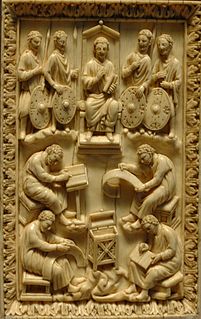
Psalm 5 is the fifth psalm from the Book of Psalms. Its authorship is traditionally assigned to king David. It is a reflection of how the righteous man prays for deliverance not only for freedom from suffering, but to allow himself to be able to serve God without distraction.
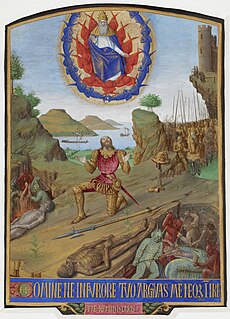
Psalm 6 is the 6th psalm from the Book of Psalms. The Psalm gives its author as King David. David's supposed intention in writing the psalm was that it would be for anyone suffering from sickness or distress or for the state of the Kingdom of Israel while suffering through oppression.

Psalm 10 is the tenth psalm of the Book of Psalms, beginning in English in the King James Version: "Why standest thou afar off, O LORD? why hidest thou thyself in times of trouble?" In the Greek Septuagint and the Latin Vulgate, it is not an individual psalm but the second part of psalm 9, "Ut quid Domine recessisti". These two consecutive psalms have the form of a single acrostic Hebrew poem. Compared to Psalm 9, Psalm 10 is focused more on the individual than the collective human condition.

Psalm 13 is the 13th psalm of the Book of Psalms, beginning in English in the King James Version: "How long, O Lord". The Book of Psalms is the third section of the Hebrew Bible, and a book of the Christian Old Testament. In the Greek Septuagint and the Latin Vulgate, this psalm is Psalm 12 in a slightly different numbering system. In Latin, it is known as "Usquequo Domine".

Psalm 22 is the 22nd psalm of the Book of Psalms, beginning in English in the King James Version:, "My God, my God, why hast thou forsaken me?" The Book of Psalms is the third section of the Hebrew Bible, and a book of the Christian Old Testament. In the Greek Septuagint version of the bible, and in its Latin translation in the Vulgate, this psalm is Psalm 21 in a slightly different numbering system. In Latin, it is known as "Deus, Deus meus".
Psalm 44 is the 44th psalm from the Book of Psalms, composed by sons of Korah and is classified in the series of lamentations of the people. In the Greek Septuagint version of the bible, and in its Latin translation in the Vulgate, this psalm is Psalm 43 in a slightly different numbering system.
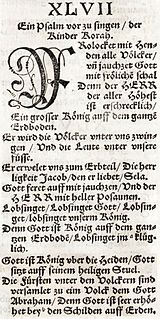
Psalm 47 is the 47th psalm of the Book of Psalms, beginning in English in the King James Version: "O clap your hands". The Book of Psalms is the third section of the Hebrew Bible, and a book of the Christian Old Testament. In the Greek Septuagint version of the bible, and in its Latin translation in the Vulgate, this psalm is Psalm 46 in a slightly different numbering system. In Latin, it is known as "Omnes gentes plaudite manibus". The psalm is a hymn psalm. It is one of twelve psalms attributed to the sons of Korah, and one of fifty-five psalms addressed to the "Chief Musician" or "Conductor".
Psalm 54 is the 54th psalm from the Book of Psalms. In the Greek Septuagint version of the bible, and in its Latin translation in the Vulgate, this psalm is Psalm 53 in a slightly different numbering system. Attributed to David, it was written for one who finds oneself betrayed by a friend.

Psalm 55 is the 55th psalm of the Book of Psalms, beginning in English in the King James Version, "Give ear to my prayer, O God, and hide not thyself from my supplication". The Book of Psalms forms part of the ketuvim, the third section of the Hebrew Bible, and is part of the Christian Old Testament. In the slightly different numbering system of the Greek Septuagint version of the Bible, and in the Latin Vulgate, this psalm is Psalm 54. In Latin, it is known as "Exaudi Deus orationem meam". The psalm is a lament in which the author grieves because he is surrounded by enemies, and one of his closest friends has betrayed him.
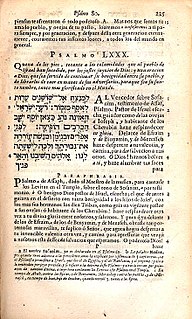
Psalm 80 is the 80th psalm in the biblical Book of Psalms.
Psalm 86 is the 86th psalm of the Book of Psalms, subtitled "a prayer of David". In the slightly different numbering system of the Greek Septuagint version of the bible, and in its Latin translation, the Vulgate, this psalm is Psalm 85.
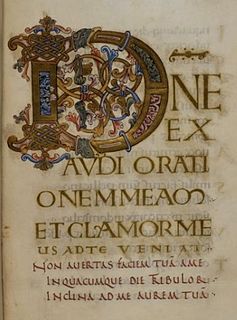
Psalm 102 is the 102nd psalm of the Book of Psalms, beginning in English in the King James Version: "Hear my prayer, O LORD, and let my cry come unto thee." In the Greek Septuagint version of the bible, and in its Latin translation in the Vulgate, this psalm is Psalm 101 in a slightly different numbering system. In Latin, it is known as "Domine exaudi orationem meam".

Psalm 116 is the 116th psalm of the biblical Book of Psalms, and the fourth psalm in the “Egyptian Hallel”. In the slightly different numbering system in the Greek Septuagint version of the bible, and in its Latin translation, the Vulgate, this psalm is numbered as Psalm 114 and Psalm 115.










